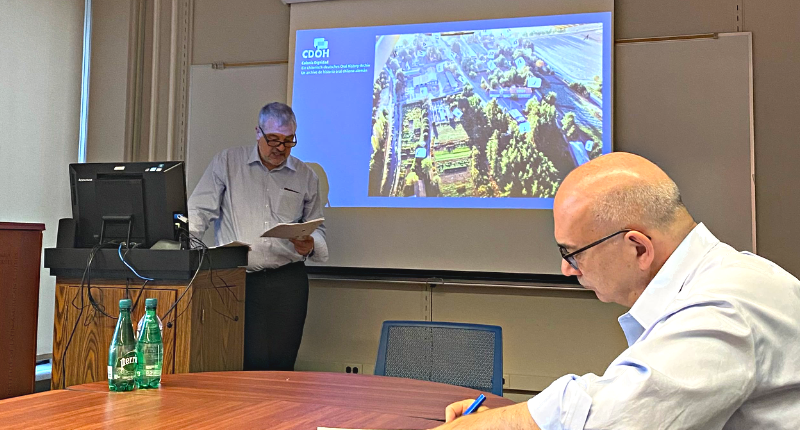German-Chilean Oral Archive About Colonia Dignidad is Presented on Campus
German professor Stefan Rinke visited ILAS to talk about the oral history archive that preserves the memory of the victims of the sect.

Founded in 1961, Colonia Dignidad (Dignity Colony) was a German sect-like settlement in Chile led by Nazi preacher Paul Schäfer, that became notorious for the crimes against its inhabitants and against opponents of the Pinochet dictatorship.
Because the existence and survival of this place was made possible through a network of favors, blackmail, and the protection of common interests that for decades worked in both countries, in recent years, the German Federal Foreign Office on behalf of the German parliament, financed “Colonia Dignidad - A Chilean-German Oral History Archive,” , a three-year project conducted during 2019 and 2022. The project was conducted by a team of researchers from the Latin American Institute of the Freie Universität Berlin, led by Professor of Latin American History Stefan Rinke, the Digital Interview Collection of the Freie Universität Berlin Library, in cooperation with Universidad Alberto Hurtado and Universidad Católica del Maule in Chile. The archive is an audiovisual repository of biographical interviews about the decades of crimes committed in the colony.
The afternoon of November 9, professor Rinke visited the Institute of Latin American Studies (ILAS), to take part in the event “Colonia Dignidad as Digital History,” organized by ILAS with the co-sponsorship of the Santiago Center. During the conversation with Columbia professor of Anthropology Claudio Lomnitz, Rinke gave details about his research on Colonia Dignidad, and how the German Parliament commissioned his team to create an archive with a multiperspective approach, as a way to ensure that the memory of the crimes that Schäfer and his collaborators committed for decades is safeguarded so that they can never take place again.
As part of the project, 64 life history interviews were conducted with former members of the cult, past political prisoners of the military dictatorship, relatives of those who were made disappeared, Chilean children who suffered sexual violence by Paul Schäfer, as well as others who were affected and/or involved. The interviews, conducted in German or Spanish, were transcribed, translated, and scientifically edited, thus giving way to an online oral archive that works as a “polyphonic space for memory.” Because the accounts in the archive are highly personal, they are under a protected framework. People wishing to access the interviews must register, demonstrate legitimate interest, and agree to the terms of use.
Rinke and Lomnitz also touched on the challenges of creating a multiperspective archive using methods that are uncommon to historians, the ethical issues related to giving former crime-perpetrators a voice on the internet, with the biggest challenge being finding a balance between the need to publish the truth of what happened while also respecting the privacy of the victims.
Finally, Professor Rinke emphasized that the aim of the project was to promote scientific research and political education regarding the history of Colonia Dignidad, and stressed the importance of using the digital archive in high schools and universities both Chile and Germany.
About Colonia Dignidad
Following accusations of child molestation, German preacher and former member of the Hitler youth Paul Schäfer, fled West Germany and settled in the countryside of central Chile. In 1961, near the town of Parral, he established Colonia Dignidad.
For thirty-six years over 300 settlers (known as Colonos) lived under a strict regime that included forced labor, physical tortures, separating children from their parents, and sexual abuse towards boys. Its main activity and source of income came from agriculture, being also home to a school and a charity hospital that served Chilean locals, contributing to consolidate a public image of the epitome of German efficiency and community life. As it was determined by the Chilean Commission for Truth and Reconciliation established after the return of democracy in 1990, the place was also used as a clandestine detention center, where dissidents of the Pinochet regime were held as prisoners, tortured, and executed.
The sect came crumbling down in 1997 after two young settlers were able to escape and denounce the atrocities perpetrated by Schäfer and his close circle of collaborators. The leaders of the cult fled the country and were arrested in Argentina in 2005. Schäfer was imprisoned and died in jail in 2010, but the wounds of the infamous transnational history of this place, that has linked Germany and Chile for over six decades, are still open among the victims.